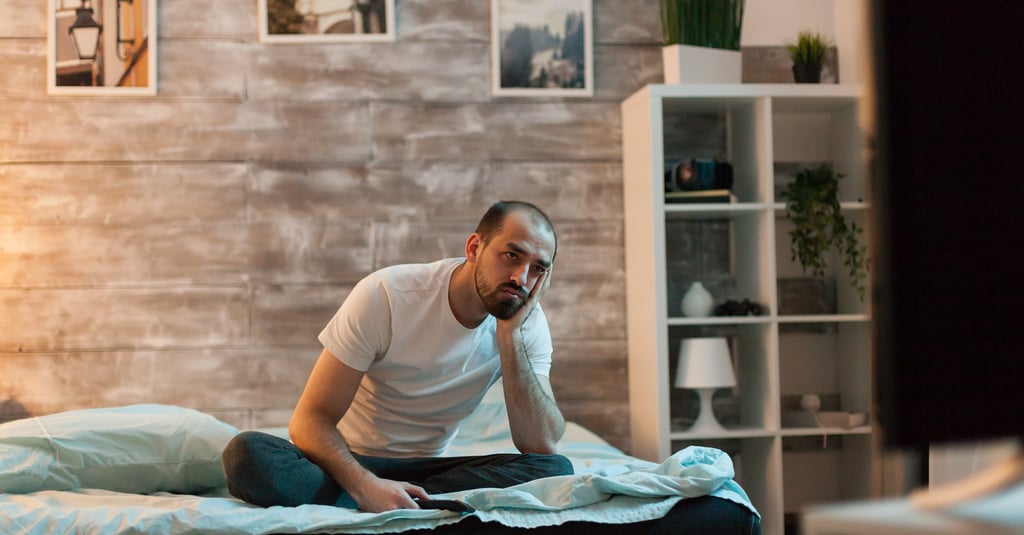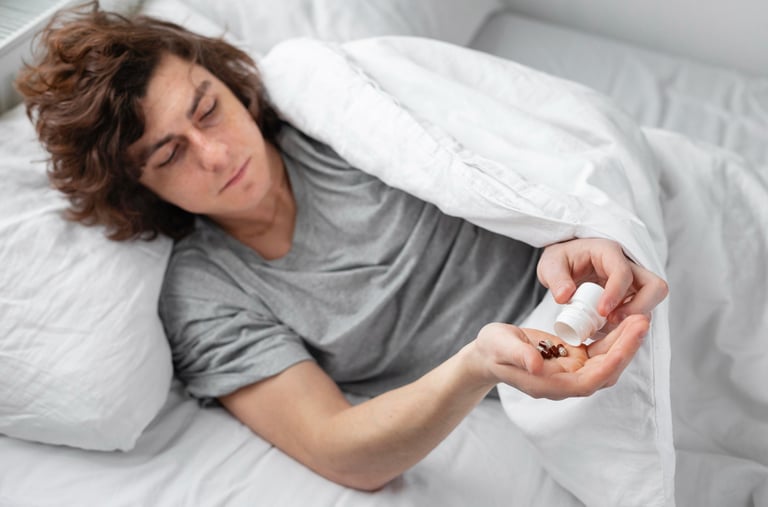Lack of Sleep: Causes, Consequences, and Solutions
Understand the problems caused by lack of sleep, daily habits that disrupt rest, and learn when melatonin or medications are recommended to improve sleep quality safely.
DORMIR
Escolha Mast
10/26/20253 min read


Lack of Sleep: Causes, Consequences, and Solutions
Sleep is essential for physical and mental health. Sleeping well is not just a matter of rest, but also of hormonal balance, memory, mood, and disease prevention. However, many people sleep less than they should, whether by choice or due to daily factors, without realizing the negative impacts it can cause.
In this article, you will discover why lack of sleep is harmful, the reasons people sleep less, daily habits that interfere with sleep, and how melatonin or medication can help — and when their use is advisable.
What Happens When We Sleep Less
Sleeping less than necessary affects almost every system in the body. Sleep deprivation is associated with:
Cognitive problems: difficulty concentrating, impaired memory, and reduced learning capacity (NIH, 2023).
Mood changes: irritability, anxiety, and a higher risk of depression (Brazilian Sleep Society, 2023).
Physical diseases: increased blood pressure, higher risk of type 2 diabetes, obesity, and cardiovascular diseases (World Health Organization, 2022).
Weakened immune system: less antibody production and increased susceptibility to infections (NIH, 2023).
In addition, chronic sleep deprivation can shorten life expectancy. Studies indicate that adults who sleep less than 6 hours per night have a higher risk of premature death compared to those who sleep between 7 and 9 hours (Harvard Medical School, 2023).
Why Some People Choose to Sleep Less
Often, sleeping less is not only a result of insomnia or health issues, but a choice driven by routine, work, or leisure. Common reasons include:
Excessive work or study: people who need to meet deadlines or study long hours end up sacrificing sleep.
Use of technology: phones, computers, and TV stimulate the brain and delay sleepiness.
Active social life: going out at night and prioritizing social activities can reduce rest time.
Belief that sleeping less increases productivity: many think less sleep allows them to do more, but this is a harmful myth.
Choosing to sleep less is not good. In the short term, it may seem productive, but in the long run, the harm to body and mind outweighs any temporary benefit.
Daily Habits That Interfere With Sleep
Besides conscious choices, there are everyday factors that disrupt sleep without people noticing:
Caffeine and stimulants: coffee, black tea, and sodas in the afternoon or evening make it harder to fall asleep.
Alcohol: although it may induce initial drowsiness, it reduces deep sleep quality.
Exposure to bright light at night: artificial light, especially blue light from screens, disrupts melatonin production, the sleep hormone (Brazilian Sleep Society, 2023).
Inadequate environment: bedrooms that are too bright, noisy, or at the wrong temperature interfere with sleep continuity.
Poor diet: heavy meals or eating too close to bedtime can cause discomfort and insomnia.
Stress and anxiety: daily worries increase brain activity and make it difficult to relax at night.
Being aware of these factors is the first step to improving sleep quality and overall health.


Melatonin: The Sleep Hormone
Melatonin is a hormone naturally produced by the brain, especially at night, and is responsible for regulating the sleep-wake cycle.
In some cases, melatonin supplements can help people with difficulty sleeping, especially those who suffer from:
Jet lag
Shift work
Circadian rhythm disorders
However, melatonin is not recommended for chronic insomnia without medical evaluation. Improper use may cause side effects such as headache, nausea, and daytime drowsiness (NIH, 2023).
Sleeping Pills: When They Are Recommended
Medications called hypnotics may be prescribed by doctors in specific cases of insomnia or sleep disorders. They should be used only under medical supervision, as they can cause:
Dependence
Tolerance (need for higher doses)
Residual daytime effects such as drowsiness and lack of concentration
Therefore, sleeping pills should not be the first solution. It is preferable to adopt sleep hygiene, including regular schedules, a proper environment, and avoiding stimulants.
How to Improve Sleep Naturally
Some simple strategies can increase sleep quality without relying on medications:
Keep consistent sleep and wake times, even on weekends.
Avoid caffeine and alcohol close to bedtime.
Reduce screen use at least an hour before sleeping.
Create a comfortable environment: dark, quiet room with a pleasant temperature.
Exercise regularly, but not immediately before bed.
Relax the mind before bed, with meditation, light reading, or deep breathing.
These measures have scientific evidence of improving sleep and overall well-being (World Health Organization, 2022).
Conclusion: Sleep Better and Live Better
Lack of sleep affects body, mind, and quality of life. Sleeping less may seem necessary or convenient, but it is a health risk in both the short and long term.
Investing in healthy habits, caring for your sleep environment, and knowing your body’s limits is the best way to ensure energy, concentration, and mental health. Supplements and medications can help, but they do not replace good habits and discipline.
By prioritizing sleep, you are investing in yourself, improving mood, memory, productivity, and preventing diseases. Start today by identifying habits that harm your rest and implement gradual changes.
Sleep well, take care of your body, and live with more quality. Thank you for reading — see you next time! 🌙
ESCOLHA MAST
Escolha Mast is an informative website that publishes blog posts and also promotes products that can help you in your quest for health and well-being.
CONTACT INFORMATION
Email: escolhamast@gmail.com
Phone: +55 068 99981-0331
© 2025. All rights reserved to Escolha Mast.
Choose to live well!
